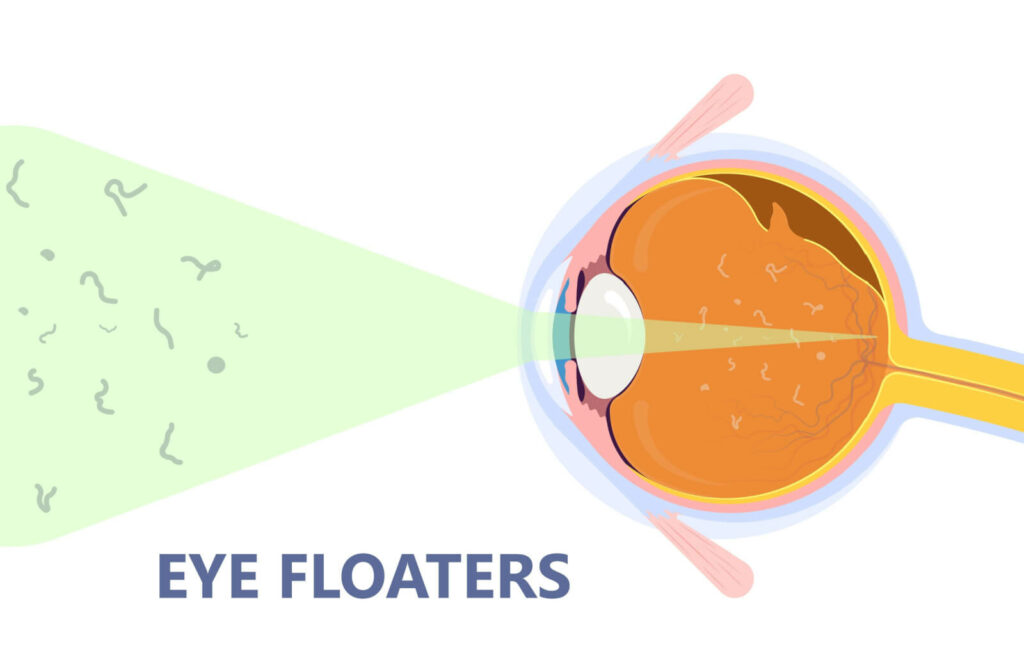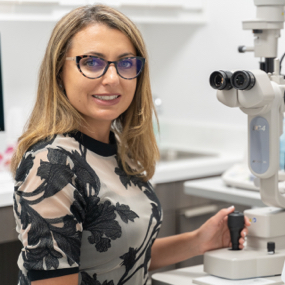Many Canadians, approximately 6 million, live with a condition known as dry eyes. Dry eyes can have many symptoms that can disrupt your daily life, like having blurred vision, mild physical irritations, and redness. Having normal changes to your vision can cause you to see eye floaters. Sometimes, with age, the appearance of eye floaters will be combined with symptoms of dry eyes. Science has shown that there is currently no link between dry eyes and the cause of having floaters.
What Is Dry Eye?
Dry eye is a condition where your eyes do not produce enough tears to properly coat the eyeball or the tears that are produced are not of high enough quality to keep your eyeball moist.
When you have dry eyes, some of the symptoms that you may have with this condition are:
- Stinging or burning feeling
- Sandy, scratchy or gritty feeling
- Changes in your vision
- Excessive tearing
- Foreign body sensation
- Irritation when blinking
- Eye redness
- Sensitivity to light and difficulty seeing in low, dim or at night
- Stringy mucus in or around your eyes
There are many factors that can affect your eye health and it is important for you to let your eye doctors know if there are sudden changes. Dry eye might seem like a minor condition that you don’t need to mention to your doctor, but it can be treated. Your eye doctor can diagnose your dry eyes and help find a solution that is right for you.
What Are Eye Floaters?
Eye floaters are different from dry eyes. When you have eye floaters, this will affect your vision differently than having dry eyes alone, but many times, people will live with both at the same time. Eye floaters look as though there are specks, black spots or grey lines around you where there are none.
Eye floaters could cause areas of your vision to be altered. Floaters might cause your eyes to:
- See black or gray spots, strings or spider web-like areas
- Not be able to see the spots/floaters in areas, when you try to look directly at it
When you notice that you have eye floaters, these symptoms need to be monitored closely. If there are changes to your vision, you might need to seek medical attention immediately. Some changes in your vision that require immediate attention from your eye care specialist include:
- New floaters or more floaters than usual
- Flashes of light in the same eye as your floaters
- Darkness on one side or multiple sides of your vision
- A grey curtain, a veil or large areas of blurriness that block your vision
These symptoms could mean that there has been something happening in your eyes that, if not caught in time, could lead to permanent damage. Many times, these symptoms are painless but could indicate that you have had a possible tear or detachment in your retina which needs to be fixed surgically.

What Causes Eye Floaters?
Your eyeball is filled with something that is called vitreous, which is a jelly-like substance. When we are born the vitreous is attached all the way around the eye but with age, it shifts and parts of it start to liquefy which is called vitreous syneresis. Sometimes when the vitreous separates from the back of the eye, collagen fibers become visible and they may cast a shadow on the retina. These appear as floaters which look like different shapes as you move your eyes. These clumps or particles of vitreous become more obvious in your vision when they fall in your line of sight. Due to your eye being filled with liquid, you might not always see these floaters as they tend to move around and do not stay in one spot.
Some people can have these floaters in their eyes from birth, but if you get these later in life, and they change quickly, it could be a sign of a serious issue and should be addressed immediately by a doctor.
Is There Anything I Can Do to Get Rid of Eye Floaters and Dry Eyes?
There are many treatments for both dry eyes and eye floaters. While you may not be able to fully get rid of either of these conditions, there are treatments so that you can be less affected and less bothered by the symptoms.
Some treatments for dry eyes include:
- Artificial tears in drop form applied directly to your eye
- Punctal plugs– tiny devices inserted into your tear ducts
- Intense Regulated Pulse Therapy
Some treatments for eye floaters include:
- Surgery to remove the vitreous inside your eyes
- Laser vitreolysis to break up the floaters inside your eyes
While these procedures are more invasive, neither will ensure that your eye floaters will go away permanently. Even with treatment, there is a chance that eye floaters may return. These treatments are not usually recommended for floaters in most cases.
Here For Your Eye Care
Brantford Eye Care is here to help care for your vision. Whether it’s for floaters, dry eyes, or anything in between, our knowledgeable and friendly team can’t wait to meet you. Book your appointment at Brantford Eye Care today to speak with one of our eye care professionals.




